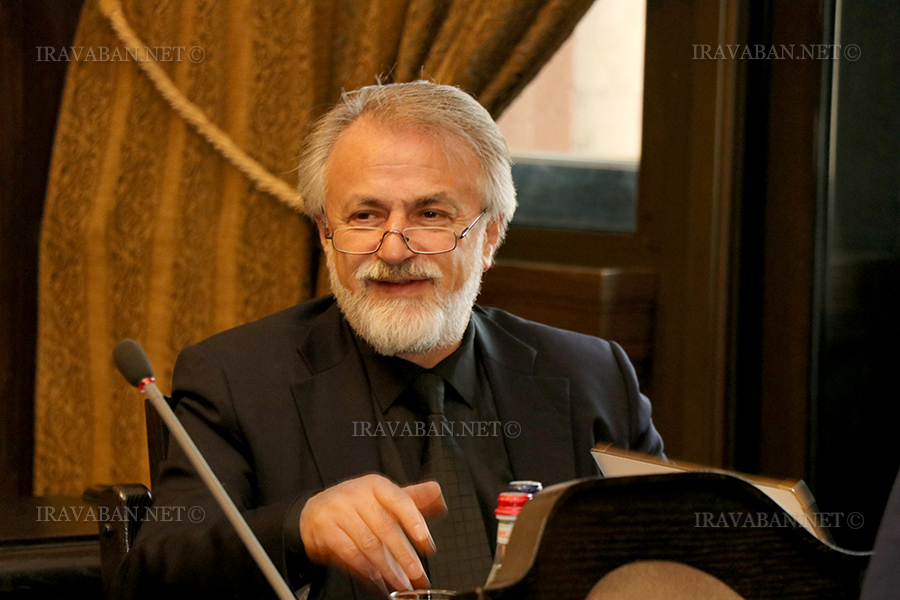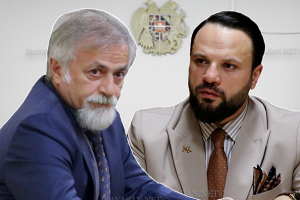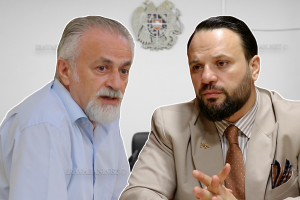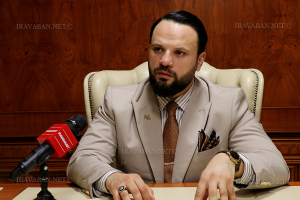Less than a year after the appointment, at the session of the Government on 27 February, 2020, the Executive decided to dismiss the Chairman of the Urban Development Committee, Vahagn Vermishyan. The issue was among the non-reportable ones.
“This is a personal insult to me, to the people of Armenia; this is an insult to the values of the 2018 Velvet Revolution in Armenia. I do not know how my statement will sound, but they believe that the people who caused such an insult should be held to strict responsibility,” Prime Minister Nikol Pashinyan announced that day.
It should be noted that the case is now in the Criminal Court of Appeal. Vahagn Vermishyan demands acquittal in all aspects of the charge.
 After Nikol Pashinyan’s these statements, Vahagn Vermishyan filed a lawsuit against the Government in the Administrative Court on 4 May, 2020. The of the First Court Instance, chaired by judge Artur Avagyan, decided to reject the submitted claim.
After Nikol Pashinyan’s these statements, Vahagn Vermishyan filed a lawsuit against the Government in the Administrative Court on 4 May, 2020. The of the First Court Instance, chaired by judge Artur Avagyan, decided to reject the submitted claim.
On 5 May, 2021, a representative of Vahagn Vermishyan appealed to the Administrative Court of Appeals, which decision needs to be addressed separately.
The appellant noted that the Administrative Court violated Articles 61 and 63 of the Constitution, misinterpreted the articles of the RA Law “On Public Service”, the provisions of the RA Law “On Bodies of State Administration System”. He noted that the Government, in terms of function, is an administrative body in the legal system, because it carries out a public function, and as such a body carrying out administration, in particular, it carries out a function related to the transition to public service, that is, it the Prime Minister submits to the government for approval of appointing or dismissing the candidate for the chairman of the Urban Development Committee.
According to the claimant, the court, “allowing the obvious and gross violations mentioned in this complaint”, misinterpreted the legal regulations, made an obviously wrong judicial act, rejecting the claim. Applying to the Court of Appeals, the appellant requested to satisfy the appellate complaint, to completely annul the act of the First Instance Court, to amend the act of the Administrative Court by issuing a new court act, or to completely annul the act of the Administrative Court, sending the case to the Administrative Court for a new examination.
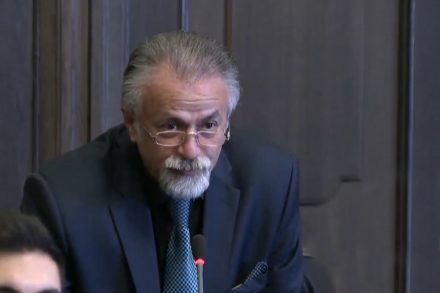 Vahagn Vermishyan’s representative in the court also referred to Article 49 of the Constitution, as well as Article 25 of the International Covenant on Civil and Political Rights, which stipulates “Every citizen shall have the right and the opportunity, without any of the distinctions mentioned in article 2 and without unreasonable restrictions”
Vahagn Vermishyan’s representative in the court also referred to Article 49 of the Constitution, as well as Article 25 of the International Covenant on Civil and Political Rights, which stipulates “Every citizen shall have the right and the opportunity, without any of the distinctions mentioned in article 2 and without unreasonable restrictions”
(a) To take part in the conduct of public affairs, directly or through freely chosen representatives;
(b) To vote and to be elected at genuine periodic elections which shall be by universal and equal suffrage and shall be held by secret ballot, guaranteeing the free expression of the will of the electors;
(c) To have access, on general terms of equality, to public service in his country.
The right to enter the public service is one of the main constitutional rights of an RA citizen, the realization of which in the conditions of a legal, democratic state in addition to a manifestation of the free choice of work, is also the realization of democracy. That right is protected by the Constitution, the order and conditions of its realization are defined by law.
The plaintiff stated that in this case, the position held by the plaintiff is an administrative position by its nature, in which case the defendant violated the Constitution, as well as the principle of legality provided by the Law “On Fundamentals of Administration and Administrative Procedure”, as well as the constitutionally guaranteed right of persons to enter the public service. Thus, the plaintiff was dismissed from his position on the basis of violation of the law, use of wrong information and without clarification.
On the basis of the above, the plaintiff requested to recognize invalid the decision to dismissed Vahagn Vermishyan and reinstate him in his former post.
On 16 June, 2023, the Court, composed of Alexandra Harutyunyan, Karen Gevorgyan and Edward Nahapetyan, decided to overturn the decision of
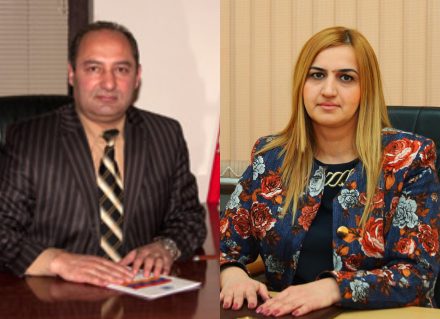
Karen Gevogyan’s photo was missing on Court.am website
the First Instance Court and partially satisfy the submitted claim. The Court found that the decision made by the First Instance Court against Vahagn Vermishyan is not legal.
Although the Court did not restore Vermishyan to his post, it declared invalid the Government Decision No. 211-A of 27.02.2020 on”Releasing Vahagn Vermishyan from the position of the Chairman of the Urban Development Committee”.
The court recorded: The Government that appointed Vahagn Vermishyan to the position was changed and in 2021 a new Government was formed, which is not Vermishyan’s employer. “…The newly formed Government has appointed the Chairman of the Urban Development Committee, therefore, according to the assessment of the Court of Appeals, the mentioned document makes it impossible to restore labor relations, in the presence of such conditions, the law has established the right to receive compensation in that situation.”
In particular, in the case of impossibility of reinstatement, the Court may not reinstate the employee to his previous job, obliging the employer, in particular, to pay compensation for not reinstating the employee in the amount of not less than the average salary, but not more than twelve times the average salary.
At the same time, the Court of Appeals recorded that the legislator did not set any criteria for determining the amount of the above-mentioned compensation and determining the amount of this compensation was left to the discretion of the Court.
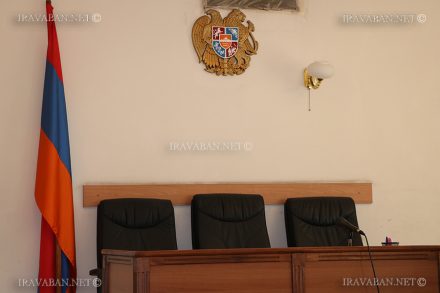 “….The legislator has established clear criteria for offering another job to an employee in case of dismissal on objective grounds, at the same time establishing, in the absence of such an opportunity, the obligation to pay compensation for the entire period of forced idleness due to the dismissal of the employee, as well as for non-reinstatement of the employee “, this is mentioned in the decision of the Court.
“….The legislator has established clear criteria for offering another job to an employee in case of dismissal on objective grounds, at the same time establishing, in the absence of such an opportunity, the obligation to pay compensation for the entire period of forced idleness due to the dismissal of the employee, as well as for non-reinstatement of the employee “, this is mentioned in the decision of the Court.
According to Part 1 of Article 265 of the Labor Code, “In case of disagreement with the change of employment conditions, termination of employment contract upon the employer’s initiative or rescission of the employment contract, the employee shall have the right to apply to court within one month following the receipt of the individual legal act (document).”
Where it is revealed that employment conditions have been changed, employment contract with the employee rescinded upon absence of lawful grounds or in violation of the procedure defined by the legislation, the violated rights of the employee shall be restored. In that case the employer shall be charged a minimum salary for the whole period of forced idleness or the difference of the salary for the period during which the employee performed work with minimum remuneration. Average salary shall be calculated by multiplying the relevant number of the days by average daily salary of the employee.
According to Part 2 of the same article, “For economic, technological and organizational reasons, or in case of impossibility of reinstatement of future employment relations between the employer and the employee the court need not reinstate the employee to his or her former office, making the employer obliged to pay compensation for the entire period of forced idleness in the amount of the average salary, prior to entry into force of the court judgment, and pay compensation in exchange for non reinstatement of the employee to office in the amount of not less than the average salary, but not more than twelve-fold of the average salary.”
The Court of Appeals also quotes one of the decisions of the Court of Cassation, by which the Court, referring to the above-mentioned article, noted that the legislator has planned 2 possible structures to restore the violated rights of the employee in disputes regarding the employment contract.
In the first case, the employee is restored to his previous job, receiving an average salary for the entire period of forced idleness.
In case 2 : the former employment relationship is not restored, and the employee receives the average salary for the entire period of forced idleness, as well as compensation for non-reinstatement.
In Vahagn Vermishyan’s case, option 2 was chosen. As mentioned earlier, the Court considers that the Government, which appointed Vahagn Vermishyan to the position was changed, the new Government was formed in 2021, which is not Vahagn Vermishyan’s employer.
The Court noted that the mentioned structures cannot operate at the same time, because they exclude each other.
In other words, if the demand for reinstatement is not met, the right of the employee to receive compensation for non-reinstatement automatically begins to operate.
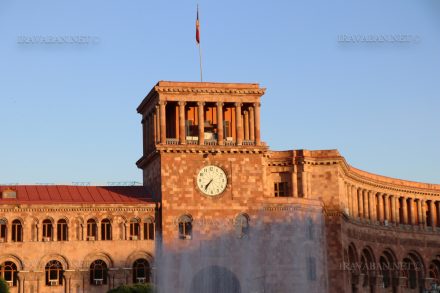 In such conditions, the Court of Appeal found that the Government should be obliged.
In such conditions, the Court of Appeal found that the Government should be obliged.
a/ To pay compensation to Vahagn Vermishyan for the entire period of forced idleness, in the amount of the average salary, until the judicial act of the Court enters into legal force.
b/ compensation for non-reinstatement of the employee in the amount of four times the average salary.
“Due to the illiteracy of the Government, about 50 million AMD should be compensated to Vahagn Vermishyan from the budget. I spoke with Mr. Vermishyan, according to our calculations, the act came into force, and the Government did not appeal. However, he is not happy with that fact, because this compensation should be given at the expense of the taxpayers,” lawyer Alexander Kochubaev said in a conversation with Iravaban.net.
However, the Court did not satisfy the petitioner’s request to restore him to his previous position.
Since then, the Government has submitted an appeal to the Court of Cassation, which was accepted into proceedings on 14 August, 2023. Ruzanna Hakobyan was appointed presiding and reporting judge. On 31 August, the Court of Cassation adopted a decision to appeal to the Constitutional Court. On the same day, a decision was made to suspend the proceedings of the case.
“Finding that the resolution of the issue of making a final judicial act as a result of the examination of the cassation complaint submitted in the mentioned case is conditioned by the application of the legal regulation stipulated in the Part 7 of Article 7 of the RA Labor Code, about the constitutionality of which the Court of Cassation has formed a reasonable doubt, therefore considering the circumstance , that the resolution of the mentioned case is possible only through the application of the provision of the cited normative legal act, the Court of Cassation made a decision on the issue of compliance of the cited legal norm with Article 49, Article 57, Part 2, and Article 146 of the Constitution of the Republic of Armenia about applying to the Court”, is stated in the decision of the Court of Cassation.
The Constitutional Court accepted the case for examination on 19 September, and appointed Vahe Grigoryan, the Vice-President of the CC, as a reporter in the case. The trial will begin on 28 November.
Iravaban.net talked with Expert on Labor Law Marat Atovmyan about applying to the CC with the mentioned articles .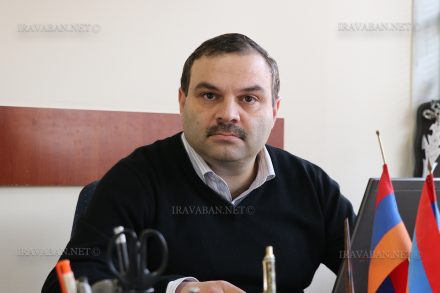
Part 7 of Article 7 of the Labor Code states: ” Employment (service) relations of persons holding political, discretional or civil positions, as well as of civil servants, officers of other state (special) services and local self-government bodies prescribed by law, as well as employment (service) relations of the employees of the Central Bank of the Republic of Armenia shall be regulated by this Code, unless otherwise provided for by appropriate laws.”
According to the expert, the legislator has clearly defined that in the case of so-called special laws, the Court must apply the provisions of the laws. “In judicial practice, these questions arise: should the court apply the Labor Code or the law?”
At the same time, the expert notes that more than once the Court of Cassation has made decisions in cases of this nature and applied the regulation of Article 7, Part 7 of the Labor Code. At that time, no one had a question that it might contradict the Constitution. In addition, reading the content of the mentioned article and the articles of the Constitution cited by the Court of Cassation, the question arises as to what kind of legal problem the judges of the Court of Cassation saw here.
The expert assumes that the CC accepted the case to settle the issue once and for all and is convinced that the court will consider the 7th part of Article 7 of the Labor Code to be in accordance with the Constitution.
T he fact that the President of the Republic of Armenia refused to appoint Ruzanna Hakobyan, the reporter of the case, to the position of the President of the Administrative Chamber of the Court of Cassation deserves special mentionioning.
he fact that the President of the Republic of Armenia refused to appoint Ruzanna Hakobyan, the reporter of the case, to the position of the President of the Administrative Chamber of the Court of Cassation deserves special mentionioning.
Iravaban.net sent a written request to Sergey Chichoyan, acting president of the SJC, asking him to tell who the candidates were nominated for the post of President of the Administrative Chamber of the Court of Cassation, and who from the SJC members participated in the vote for selecting candidate. We also asked to present the voting results, on how many votes each of the candidates received.
In response, the SJC referred to Article 134 of the Constitutional Law “Judicial Code”, which defines the procedure for appointing the President of the Chamber of the Court of Cassation, and stated that no information could be provided, as the election was made behind closed doors and only council members participated in it.

